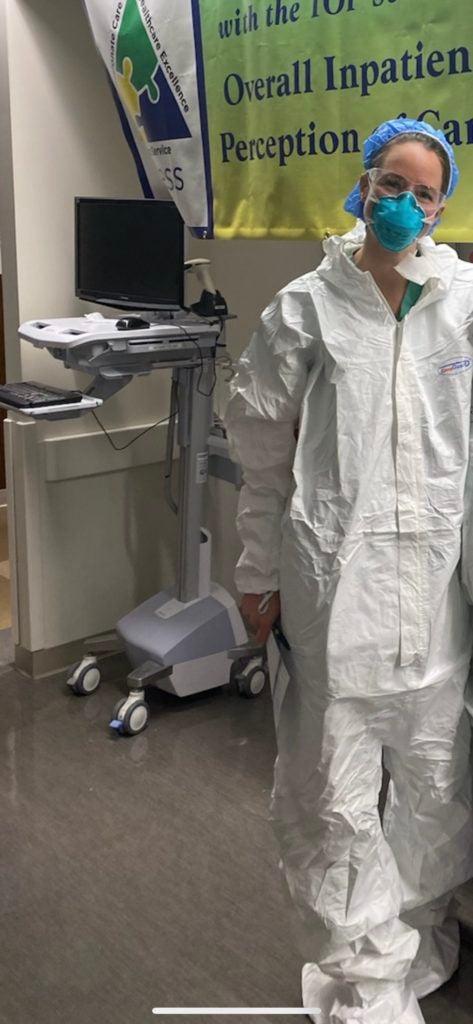Now a Nurse Anesthetist, BSN Alumna Cares for Patients With COVID-19 in New Jersey
May 22, 2020 – After Georgetown, BSN alumna Kristen Reeve Quirk (NHS’12) went on to become a certified registered nurse anesthetist (CRNA). During the COVID-19 pandemic, she has been caring for patients in New Jersey.
“The Georgetown emphasis on cura personalis formed my personal nursing philosophy that when patients are critically ill, they are at their most vulnerable, and it is the nurse’s responsibility to care for the whole physical, emotional, and spiritual person,” she said.

Question: Tell us a bit about your career.
Quirk: I work for an independent anesthesia group that provides services for St. Barnabas Medical Center and Newark Beth Israel Medical Center in northern New Jersey. As a certified registered nurse anesthetist, I typically spend my days in the operating room, anesthetizing patients for surgical procedures.
Question: How has your role as an advanced practice nurse evolved because of COVID-19?
Quirk: The hospitals in my area saw a surge in COVID-19 positive patients in late March. We stopped performing elective surgical procedures, and I shifted to working on the COVID-19 response in two different roles. First, our team of anesthesia providers quickly formed intubation teams. I volunteered to join the teams, and we service the hospitals 24 hours a day, 7 days a week. In this role, I am responsible for responding to emergency calls for COVID-19 patients that are in respiratory distress. I administer sedation, intubate them, and place them on a ventilator.
My second role is the management of COVID-19 intensive care unit (ICU) patients. In early April, our ICUs were becoming inundated with critically ill patients needing ventilators. The hospitals converted our recovery rooms into negative pressure units, which were able to accommodate overflow ICU patients. In these ICUs, I function as a critical care advanced practice nurse, collaborating with the different disciplines to direct the treatment plan for COVID-19 patients.
As former ICU nurses with advanced training in anesthesia, CRNAs are uniquely positioned to manage the complex needs of COVID-19 patients. I draw upon my experiences and training to manage sedation, optimize hemodynamics, and manage the ventilation and weaning of patients. I also mentor nurses who don’t typically work with critically ill patients and guide them in ICU-level care.
Question: What has it been like to be a nurse during the pandemic?
Quirk: This has been the most challenging period of my nursing career since graduating in 2012. Patients and staff alike are frightened as there are so many unknowns about the outcomes of this virus. We’ve had to constantly adapt to the changing needs of patients and the hospital, and band together to care for the influx of patients. There has been a lot of loss and heartbreak, but I have also witnessed amazing displays of compassion and instances of patients overcoming incredible odds.
Question: How did the BSN Program prepare you for your career and your approach as a nurse during the pandemic?
Quirk: The Georgetown emphasis on cura personalis formed my personal nursing philosophy that when patients are critically ill, they are at their most vulnerable, and it is the nurse’s responsibility to care for the whole physical, emotional, and spiritual person. During this pandemic, I’ve encountered countless sick and vulnerable patients. When a patient needs to be intubated, they are struggling to breathe, exhausted, terrified, and have dangerously low oxygen levels.
Despite the emergency, I try to take a moment to hold their hand, look them in the eye, and communicate to them (through the many layers of personal protective equipment) that we will take care of them. When I work in the ICUs, I call families to update them on their loved one’s status and facilitate video conferencing to care for the emotional needs of both the patients and families.
My Georgetown education also taught me the value of interdisciplinary collaboration, respect, and empowering others. While at Georgetown I was fortunate to have been mentored by leaders in the field of nursing and academics, and during this pandemic I’ve been given the unique opportunity to replicate their example.
I am so impressed by the way the entire medical community came together to support the pandemic response. Nurses with minimal critical care experience stepped outside of their comfort zones, volunteering to work in ICUs, and countless clinicians have flown across the country to fully staff our hospitals. I try to empower these individuals and show my gratitude by mentoring them and being a resource for them in an unfamiliar environment.
Question: Any other thoughts you’d like to share?
Quirk: The outpouring of support from the community has been so encouraging and uplifting. There have been countless donated meals, supplies, thank you notes, signs, parades, and weekly neighborhood cheering. Knowing that our efforts are appreciated and that the community is behind us makes all the difference as we continue to combat this pandemic.
- Tagged
- COVID-19
